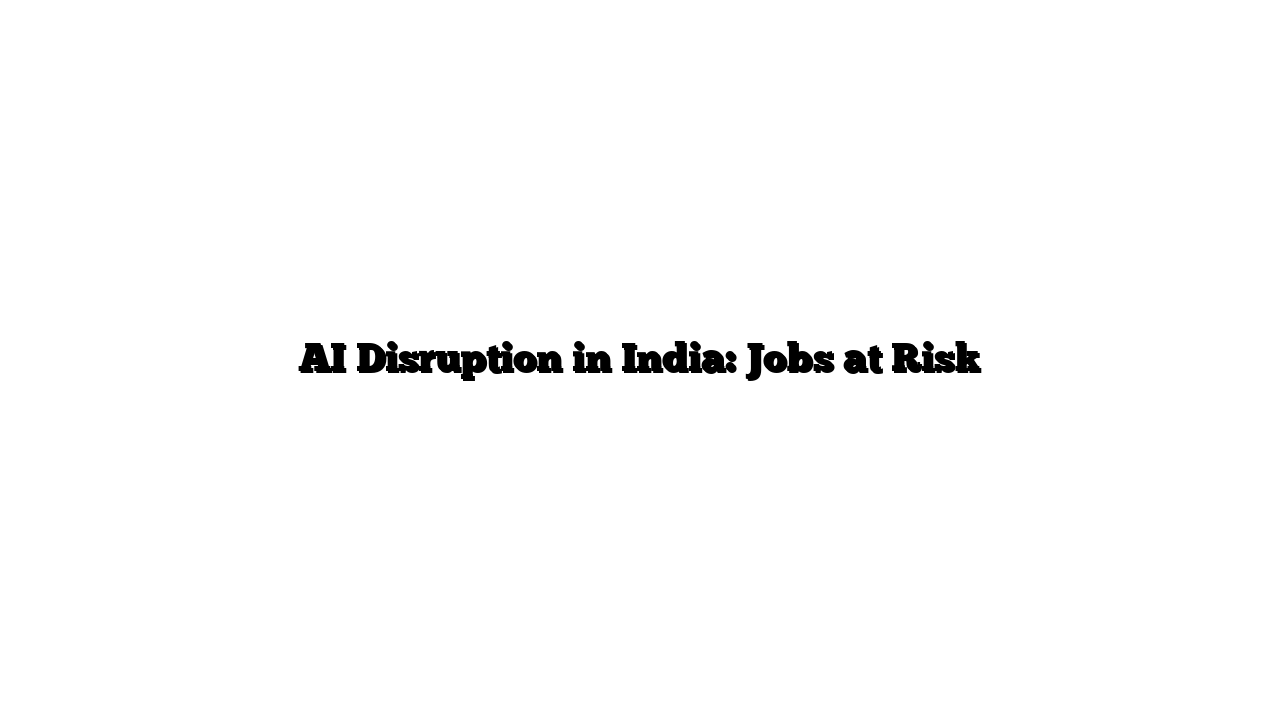Artificial intelligence (AI) is changing the world as we know it, and India is not immune to its impacts. As AI continues to advance, certain jobs are bound to be disrupted or even replaced entirely. This shift can be uncomfortable, especially for those working in industries that rely heavily on human labor. However, understanding which jobs are most at risk can help individuals prepare for the future.
In this article, we explore the jobs that are most likely to be replaced by AI in India, drawing insights from Ex Engineer‘s perspective on AI’s growing influence.
1. Software Engineers: At Risk?
While many might assume that software engineers are safe from AI disruption, the reality is different. AI is already automating many coding tasks that were once handled by humans. In India, software engineers, especially those working in large outsourcing companies like Infosys, TCS, and Wipro, are at risk. These companies employ vast numbers of developers to build basic software applications, but with AI-driven tools, much of this work can be automated.
While the demand for highly skilled AI scientists or engineers working on innovative solutions will remain, those involved in routine coding tasks (like building simple websites or apps) may find their jobs automated. This could lead to a reduction in the number of entry-level positions and a shift toward higher-value work.
2. Data Entry Operators and Customer Support
Jobs involving repetitive tasks, such as data entry or customer support, are especially vulnerable to AI automation. AI tools, like chatbots, are already handling customer inquiries with increasing accuracy. For instance, AI can process customer requests, answer questions, and even issue refunds—tasks once performed by human agents in call centers.
While the technology can handle many aspects of customer service, it still lacks the nuanced judgment required for decisions like issuing refunds or dealing with complex complaints. However, as AI improves, these areas could also be automated, potentially displacing many customer support jobs in India.
3. Marketers and Advertisers
In the marketing sector, AI is becoming a powerful tool for automating ad campaigns, analyzing consumer behavior, and even generating content. Tasks such as creating targeted advertisements, social media posts, or SEO-driven content can all be automated using AI algorithms.
Digital marketing professionals who rely heavily on data analysis or content creation could be replaced by AI tools capable of performing these tasks with higher efficiency and lower costs. While strategic roles in marketing may still require human creativity, the more routine aspects of marketing will likely be automated.
4. Legal Professionals and Paralegals
AI is also making inroads into the legal industry. In India, many law firms rely on paralegals for document review, contract analysis, and legal research. AI tools are capable of scanning legal documents, identifying key clauses, and even providing initial drafts for contracts or legal opinions.
This could dramatically reduce the need for paralegals and junior lawyers in firms, especially for routine tasks. However, like other fields, legal professionals who focus on high-level strategy, negotiation, and client relationships will likely remain essential.
5. Designers and Content Creators
AI is revolutionizing the design industry as well. Tools like DALL·E are already capable of generating high-quality visual designs based on simple prompts, disrupting the work of graphic designers and illustrators. Similarly, AI-driven platforms are being used to generate written content, such as blog posts, advertisements, and social media updates.
While content creators in India may still have a role, AI-generated content is becoming more competitive, reducing the need for human writers in some areas. Content creation focused on mass appeal might see a decline as AI-generated content becomes more prevalent.
6. Social Media Influencers
Interestingly, while AI is automating many jobs, the role of social media influencers might actually be enhanced by AI. As AI tools allow content creation to become faster and cheaper, influencers with a strong personal brand and distribution network will remain influential.
AI might reduce the reliance on content creators who only focus on viral content, as people will increasingly trust influencers who provide authentic, insightful, and in-depth commentary. In the future, distribution—how influencers manage and grow their audiences—will become even more critical than content creation itself.
7. Offline Retail and Logistics
The retail sector is also seeing shifts as e-commerce giants, empowered by AI, continue to dominate. In India, kirana stores or small local shops may face competition from AI-driven logistics and online retail platforms like Amazon and Flipkart. AI can streamline inventory management, product recommendations, and customer service, reducing the need for physical stores or human interaction.
However, offline stores may not disappear entirely, as there’s still a strong demand for personalized shopping experiences that AI currently can’t replicate. That being said, delivery drones and automated warehouses are set to transform logistics and retail in India, making it a dynamic space to watch.
Preparing for the Future
As AI continues to evolve, it’s important to understand the types of jobs that are most likely to be disrupted. Software engineers, data entry operators, marketers, customer support agents, and other white-collar workers in India should consider upskilling in areas like AI, machine learning, and human-centered design to stay competitive.
By embracing technology and adapting to new roles, workers can ensure they remain valuable in an increasingly AI-driven economy.
For more tips and insights, visit our website Link.
